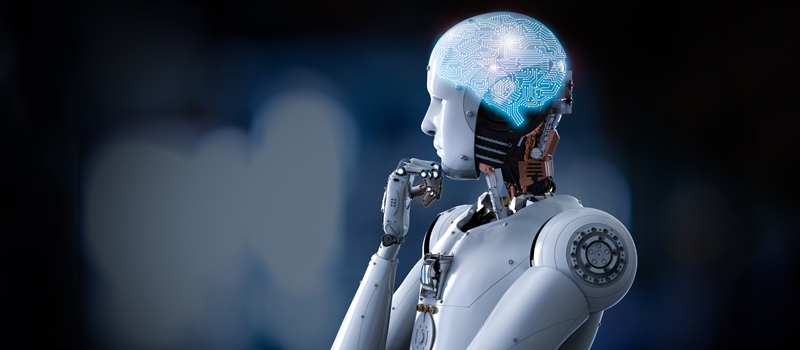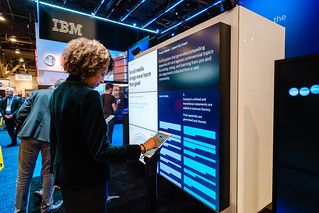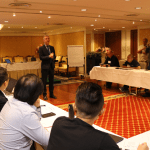
The United Nations AI for Good initiative, created three years ago by the International Telecommunication Union (ITU), XPRIZE, ACM, and 34 sister UN agencies, promotes the use of Artificial Intelligence (AI) to address the most pressing global challenges such as poverty, education, health care, and the environment.
The UN is working to keep AI development, the central piece of the “Fourth Industrial Revolution,” inclusive and transparent to make sure that AI helps all segments of society equally.
This year’s AI for Good Global Summit was very well attended, growing from 700 participants last year to 2,500 in 2019.
The goal of the summit identified practical opportunities for AI to accelerate progress toward achieving the UN Sustainable Development Goals (SDGs). In order to implement solutions, the biggest issue is establishing a format for large–scale international cooperation, a standard that is robust, transparent, and stable to certify that data is shared in the same format. This is where the ITU gets involved. This process is required to ensure that AI benefits ALL and is really for the good, not for the bad.
This event attracted a very diverse crowd. AI experts from industry, academia, global business leaders, heads of UN agencies, NGOs, inventors, world chess champions, world racing champions, and even musician technologists met in Geneva from 27 to 31 May 2019. The show floor was dynamic with live demos from IBM’s Watson live debater, Fusion’s exoskeleton, Roborace’s first self-driving racing car, social robots for the care of the elderly, and AI-inspired performances.

Source: IBM Research Flickr
IBM previously conducted spectacular demos of man versus machine in playing games: e.g., Deep Blue (chess), Watson (Jeopardy), and AlphaGo (go game advantage AI). The latest presented live was Watson’s “Project Debater – Speech by Crowd” in Geneva.
This debate technology goes far. The algorithm captures the notion of an argument; it collects arguments from more than 100,000 people (through social media and other sources), and generates a comprehensive narrative. With applications in sales and marketing, the IBM “Speech by Crowd” will be released within a few months to companies interested in using it.
Although there is no common consensus of what AI is or if the name is correct, everybody agrees that AI has the potential to alter our lives to a great extent. The time to talk, to establish some rules and structures to prevent the next industrial revolution from becoming a “winner takes-all” event is now. The crucial factor for managing societal changes induced by AI, IoT, and machine learning is time. Do we have this time?
As a matter of urgency, experts at this summit propose to rethink education; health care; the environment; social safety issues; relationships between individuals, state, and the corporate sector; and inequalities induced by technical progress.
The work of the conference has been divided into five tracks:
- AI Education: Reaching and Engaging 21st Century Learners
- Good Health and Well-Being
- Scaling AI for Good
- AI, Human Dignity & Inclusive Societies
- AI for Space
For a life of multiple careers and skills, people need an education that prepares them for a lifelong process of training and retraining. This is not easy as humans hate insecurity.
Two projects in education have been launched here:
- AI for Families – to educate communities, parents, educators, and children about AI
- AI Mentoring – a hands-on program to help industry professionals in their reflection and AI goal setting
Under the AI for Youth initiative, Ericsson and UNESCO launched a new digital skill learning program to scale up skill development in AI and other key digital skills for young people.
AI for Health founded a focus group last year and work is in progress on a standardized framework for benchmarking the evolution of AI solutions for early detection of outbreaks, diagnosis, drugs, and much more. ITU and WHO are founding members.
AI, Human Dignity, & Inclusive Societies evaluates accountability and privacy concerns. It is not an easy task as we do not have a rule book to follow, and today’s regulatory laws are outdated. There are issues to be considered like protection of minorities and vulnerable people; to make sure that data, coding, and system strategists come from a diverse and inclusive environment; that AI does not interfere with human rights; and that AI will not exacerbate the digital divide. UNICEF and UNESCO are leading some projects on AI and human dignity regulations, AI and children’s rights, and AI and digital identity.
AI for Space includes a look at opportunities through satellite imagery. It is no secret that since 2017, it has become possible to photograph the entire earth surface every day.
Satellite imagery and AI have the potential to map poverty, schools, recreational areas, and crops. This mapping could allow adequate development projects linked with SDGs for a real global AI positive impact. Spacecraft healthcare can be a new application of AI and is promoted by ESA as well as AI “Personal Assistant” on space control missions. A Special Interest Group has been set up to study how data generated from a space mission can be used with AI to generate machine data models.
The AI for Good Global Summit recognized that AI has the ability to shape the world for a better future but key concerns remain on what can be achieved, what are the transformations on the horizon, how much control we want to give to a machine algorithm, who is accountable, what are the human and political factors to be considered, and much more. It requires us to “think differently.”
Mr. Houlin Zhao, Secretary-General of the ITU, observed, “We must balance technological progress with social progress – unprecedented collaboration among all stakeholders is needed to achieve safe, trusted, and inclusive AI to accelerate progress toward the Sustainable Development Goals.”







